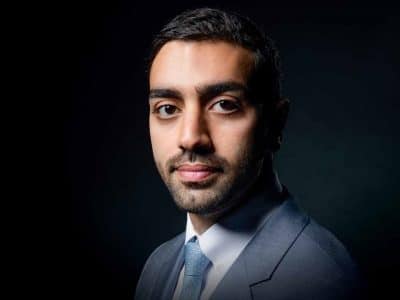As the UAE real estate market went into free fall as the fallout from Dubai spread, one emirate saw the benefits of a prudent approach begin to pay off. Sometimes, slow and steady really does win the race.
As head of one of the oldest free zones in the UAE, Sharief Habib Al Awadhi has been in pole position to oversee Fujairah’s growth from a sleepy backwater to a burgeoning maritime and petrochemical hub on the UAE’s other coastline.
However, Al Awadhi has been fiercely critical of the manner in which the UAE’s free zones have been conducting their business in the wake of the economic downturn.
“What we have failed at in the last few years, with respect to all the zones, including Fujairah Free Zone, is that we did not develop our [zone’s] brands,” the director general tells Arabian Business.
“People nowadays know the available facilities, you don’t need to go anywhere in the world and say, ‘Come to the UAE.’ You need to say, ‘why should you come to the UAE in particular? What can we provide your industry?’” he says.
A particular bugbear is that free zones from the smaller emirates tend to take their lead from Abu Dhabi and Dubai, rather than be innovative and create their own niche industries which would sustain them through tough economic times.
“For example, in Dubai, they’ve developed industries, they’ve developed tourism, free zones, real estate, but in many of these zones, it was a matter of copy and paste, everybody was doing similar business and of course, it flooded the market. We know about the international crisis, but it’s not only that, we’ve overdone many things,” Al Awadhi says. “You have a country with a limited population, a limited geographical space, too many shopping centres, too many hotels, too many resorts, it’s too many. Most of these zones have been doing the same thing, selling the same ideas.”
He also slammed incentives that were used previously, such as offering cash and government partnerships to companies establishing offices in free zones, which he said had no place in the new climate.
“Though some companies talk about offering some kind of direct support or some kind of finance, it seems, to be frank, dishonest,” he says.
“To offer finance you have to have a lot of securities, a lot of support… it’s not easy, and in the current scenario, I don’t see any zones wanting to indulge [in it].”
On the other hand, Fujairah largely ignored the real estate market, a factor that helped prevent rents in the emirate sliding as far as other northern emirates. Instead, the focus has been on developing its ties with the oil and gas industries, with the development of a $3.3bn, 350km pipeline from Abu Dhabi to Fujairah expected to bring in large amounts of revenue.
The emirate’s location on the East Coast has definitely been a factor in its recent success, Al Awadhi said. Abu Dhabi seems to agree, with the UAE capital investing heavily in the emirate, building the country’s biggest power and water treatment plants and a facility to store imported grain. Being on the other side of the Strait of Hormuz gives Fujairah direct access to the Indian Ocean and the Indian Subcontinent, which gives it a unique advantage over other free zone rivals in the emirates, Al Awadhi said.
Abu Dhabi intends to bank on this unique advantage by diverting a percentage of its oil output past the Strait of Hormuz through the pipeline, thereby avoiding any threat to supply from Iran. The strategy is similar to one pursued by Saudi Arabia, which diverts a quarter of its crude oil exports through the Red Sea port of Yanbu, while importing 60 percent of its goods from Jeddah.
Another benefit of Fujairah’s location is that it has helped create one of the world’s largest bunkering ports, comparable only to Rotterdam and Singapore, Al Awadhi said.
“Fujairah port has prepared itself slowly, over the last one or two years for oil and gas,” he adds, “The storage, the tank farm, the pipeline, the export of 1.2 million barrels of oil a day, it’s a totally different market, and we have developed ourselves to be ready for the market.”
Al Awadhi says that he expects significant foreign direct investment in the petrochemical industry in 2011 and expects $100m to be invested by the end of the year. Of that investment, he said that 60 percent of it would be local investment, while the remaining 40 percent would be from foreign investors.
In addition, the UAE has allocated $1bn from the federal budget to help build 35 investment projects in Fujairah over the next three years.
“Many people think that’s a very small number, but we’re not just talking about trading and representative offices, we’re talking about people coming to put up a proper base in the UAE, a proper office, a proper existence,” he says.
Al Awadhi adds that he expected the import-export trade for the emirate to be in the range of $1.49bn in 2011, while he predicted GDP for 2011 not to be below $667m.
Combined with the port and the maritime industry, Al Awadhi estimated that the free zone generated approximately 70 percent of the emirate’s economy.
At a modest estimate, trade from the Fujairah Free Zone itself accounted for nearly 50 percent of the emirate’s GDP, he added.
In addition, he said that he expected Fujairah’s underdeveloped real estate market to receive a boost in the coming year, benefiting from being the least affected by the property market collapse that saw real estate prices fall by 60 percent in Dubai. In comparison, the emirate saw a mere ten percent fall in prices, a report by property service company, Asteco said, followed by Sharjah at 26 percent.
In the last two years, the majority of companies joining the Fujairah Free Zone have been in the fields of real estate and construction, laying the ground for an upswing in real estate investment, he says. “The majority that we’ve been catering to have been regarding construction, building, engineering, designing and arrangements to do with the related fields of real estate activities.”
“I think in 2011, we’ll see the same, but more specific. For example, we’re expecting oil terminals and oil activities, so the engineering type will remain but will be more of classified, specialised terms,” he adds.
Al Awadhi says that he saw 2011 as being positive for Fujairah, as 2010 saw better approaches and better companies registering in the free zone, and many companies reshaping and redesigning their staff, which would lead on to a more streamlined approach to business, which would benefit them in the long run.
“I think you’ll have to be more inventive to see what the world needs, we’ll have to modify, as we’ve had to modify our industries and policies over the last few years,” he says.







